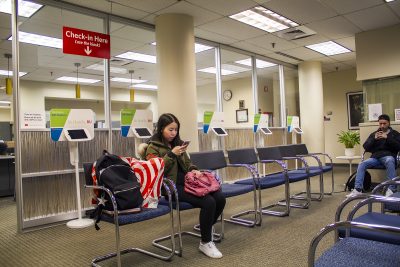
When Emma Seslowsky made an appointment with Student Health Services’ Behavioral Medicine department for her depression and anxiety, she was told SHS doesn’t see people long-term for behavioral health.
“I spoke with a woman and kind of told her the entire narrative of my journey with mental health issues, which is exhausting in and of itself, and then she told me she couldn’t see me long term, and referred me to someone else,” Seslowsky, a junior in the College of Communication, said. “And then I had to kind of tell the whole story again.”
College students nowadays often have to wait for days or even weeks before they can get an initial exam from their university’s student health establishments, according to an article published on Feb. 6 in STAT, a national science and medicine publication.
Time flies by quickly in college, and that is why students’ mental health needs should be addressed in a timely fashion, said Megan Thielking, author of the article.
“Things move so quickly that being put on a waitlist for three weeks can really affect your school performance. It can affect your mental health,” she said. “In college, since so much is relying on you to be able to perform academically, your scholarships might rely on you to be able to perform academically, your standing in school, your standing in sports teams. There’s a lot more that’s time sensitive for students.”
At BU, the number of students coming to Behavioral Medicine in crisis has more than doubled in the last four years, from 647 in the 2014-2015 school year to 906 in the 2015-2016 school year, a 40 percent increase, BU spokesperson Colin Riley said.
“One of the keys of addressing the greater demand has been the funding of additional positions in behavioral medicine,” Riley said. “We do have two 24-hour crisis counselors. That means someone is available 24 hours a day, 365 days of the year and that’s just the crisis counseling.”
Riley said SHS is not designed to assist students with mental health on a long term basis.
“Essentially, you’re going to end up trying to get situated with a counselor, or someone outside … and they do provide referrals,” Riley said. “But those are a real challenge. It’s not unique to Boston University, or Student Health Services. It’s the nature of demand right now, and resources.”
It’s difficult to meet this demand, Thielking said, because of “logistical hurdles.”
Thielking’s research identified counselor-to-student ratios across the nation. At Cornell University, a school that has 14,315 undergraduates, there is one counselor to every 447 students. At Indiana University Bloomington, a school that has about 38,364 undergraduates, there is about one counselor to every 1,535 students.
Boston University was not contacted for the survey.
“It’s hard to apply the findings themselves of the ratios to anyone specifically because it really just varies so widely from one school to the next,” Thielking said. “But, if you look at the national data, large schools on average tend to have worst ratios than smaller schools do.”
Lisa, a COM junior who requested to keep her last name confidential, said she came to Behavioral Medicine and was quickly referred to the disability center.
“My problems are somewhat complex — because of my psychiatric medication, I have developed other kinds of physical health problems — so it is sometimes hard to treat me, and no doctor referred by BU fills in the position to treat me,” she said.
Not all students experience these wait times. Ian Mallard, a sophomore in the College of Arts and Sciences, said he had a more positive experience when approaching SHS about his depression and anxiety.
“Our conversations went very in-depth into my mental health,” he said. “It was understood that going there every other week could be a long term thing, [but] it was not recommended and they can help send you to an outside [counselor].”
Thielking said in her study that there are a variety of solutions and efforts to address mental health needs.
A new Student Government committee, the Mental Health Initiative, is one way that Boston University students are working to fill some gaps. It’s a forum with representatives from different mental health student groups on campus with a set focus on specific policy endeavors, said Ramya Ravindrababu, founder and co-chair of the initiative.
In the past, a member organization of the Mental Health Initiative, Actively Moving Forward, proposed and brought to fruition a bereavement policy that allows students to have a certain number of excused absences for a death in the family, Ravindrababu added.
“We’re trying to be really mindful of the huge number of people in our administration that work really hard and think for a very long time day in and day out, how best to keep students safe,” the senior in CAS said. “We’d just like to bring another voice to the table.”
CORRECTION: In an earlier version of this article, we stated that the Initiative proposed a bereavement policy. However, that policy was made by a member organization, Actively Moving Forward. We regret making the mistake.





This article represents an incorrect version of the work that the mental health committee does. A member organization of the committee, Actively Moving Forward, proposed and passed a university wide bereavement policy. The committee was proud to stand with AMF and is looking forward to supporting the intitiatives and collaborations of our members in the years to come.
Hi! Nice piece! Caught a mistake for the future: “At BU, the number of students coming to Behavioral Medicine in crisis has more than doubled in the last four years, from 647 in the 2014-2015 school year to 906 in the 2015-2016 school year, a 40 percent increase, BU spokesperson Colin Riley said.” — a 40% increase does not constitute more than doubling. Keep up the good work.